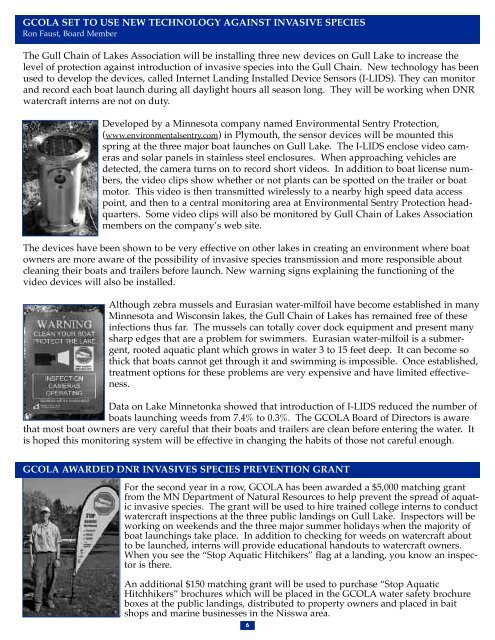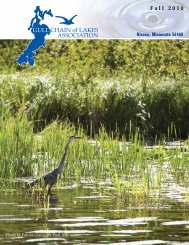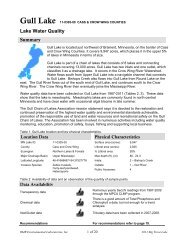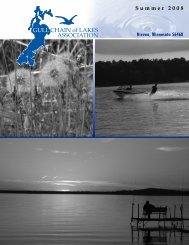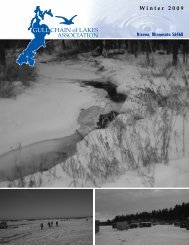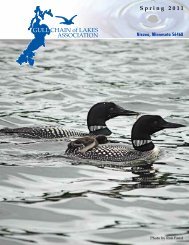07-3081-Spring newslet - Gull Chain of Lakes Association
07-3081-Spring newslet - Gull Chain of Lakes Association
07-3081-Spring newslet - Gull Chain of Lakes Association
You also want an ePaper? Increase the reach of your titles
YUMPU automatically turns print PDFs into web optimized ePapers that Google loves.
GCOLA SET TO USE NEW TECHNOLOGY AGAINST INVASIVE SPECIES<br />
Ron Faust, Board Member<br />
The <strong>Gull</strong> <strong>Chain</strong> <strong>of</strong> <strong>Lakes</strong> <strong>Association</strong> will be installing three new devices on <strong>Gull</strong> Lake to increase the<br />
level <strong>of</strong> protection against introduction <strong>of</strong> invasive species into the <strong>Gull</strong> <strong>Chain</strong>. New technology has been<br />
used to develop the devices, called Internet Landing Installed Device Sensors (I-LIDS). They can monitor<br />
and record each boat launch during all daylight hours all season long. They will be working when DNR<br />
watercraft interns are not on duty.<br />
Developed by a Minnesota company named Environmental Sentry Protection,<br />
(www.environmentalsentry.com) in Plymouth, the sensor devices will be mounted this<br />
spring at the three major boat launches on <strong>Gull</strong> Lake. The I-LIDS enclose video cameras<br />
and solar panels in stainless steel enclosures. When approaching vehicles are<br />
detected, the camera turns on to record short videos. In addition to boat license numbers,<br />
the video clips show whether or not plants can be spotted on the trailer or boat<br />
motor. This video is then transmitted wirelessly to a nearby high speed data access<br />
point, and then to a central monitoring area at Environmental Sentry Protection headquarters.<br />
Some video clips will also be monitored by <strong>Gull</strong> <strong>Chain</strong> <strong>of</strong> <strong>Lakes</strong> <strong>Association</strong><br />
members on the company’s web site.<br />
The devices have been shown to be very effective on other lakes in creating an environment where boat<br />
owners are more aware <strong>of</strong> the possibility <strong>of</strong> invasive species transmission and more responsible about<br />
cleaning their boats and trailers before launch. New warning signs explaining the functioning <strong>of</strong> the<br />
video devices will also be installed.<br />
Although zebra mussels and Eurasian water-milfoil have become established in many<br />
Minnesota and Wisconsin lakes, the <strong>Gull</strong> <strong>Chain</strong> <strong>of</strong> <strong>Lakes</strong> has remained free <strong>of</strong> these<br />
infections thus far. The mussels can totally cover dock equipment and present many<br />
sharp edges that are a problem for swimmers. Eurasian water-milfoil is a submergent,<br />
rooted aquatic plant which grows in water 3 to 15 feet deep. It can become so<br />
thick that boats cannot get through it and swimming is impossible. Once established,<br />
treatment options for these problems are very expensive and have limited effectiveness.<br />
Data on Lake Minnetonka showed that introduction <strong>of</strong> I-LIDS reduced the number <strong>of</strong><br />
boats launching weeds from 7.4% to 0.3%. The GCOLA Board <strong>of</strong> Directors is aware<br />
that most boat owners are very careful that their boats and trailers are clean before entering the water. It<br />
is hoped this monitoring system will be effective in changing the habits <strong>of</strong> those not careful enough.<br />
GCOLA AWARDED DNR INVASIVES SPECIES PREVENTION GRANT<br />
For the second year in a row, GCOLA has been awarded a $5,000 matching grant<br />
from the MN Department <strong>of</strong> Natural Resources to help prevent the spread <strong>of</strong> aquatic<br />
invasive species. The grant will be used to hire trained college interns to conduct<br />
watercraft inspections at the three public landings on <strong>Gull</strong> Lake. Inspectors will be<br />
working on weekends and the three major summer holidays when the majority <strong>of</strong><br />
boat launchings take place. In addition to checking for weeds on watercraft about<br />
to be launched, interns will provide educational handouts to watercraft owners.<br />
When you see the “Stop Aquatic Hitchikers” flag at a landing, you know an inspector<br />
is there.<br />
An additional $150 matching grant will be used to purchase “Stop Aquatic<br />
Hitchhikers” brochures which will be placed in the GCOLA water safety brochure<br />
boxes at the public landings, distributed to property owners and placed in bait<br />
shops and marine businesses in the Nisswa area.<br />
6


